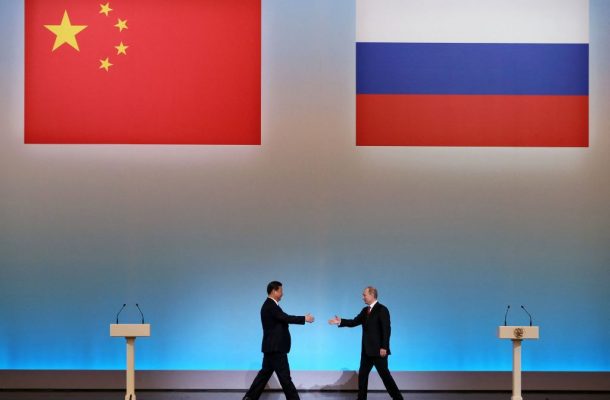The tiger and the bear

Beijing’s goals, set out in numerous speeches by Xi Jinping and in decisions and actions, are clear now. Number one remains Xi and the Chinese Communist Party staying in power indefinitely as rulers of China’s 1.4 billion people—Xi’s real ‘China dream’.
Xi and his acolytes want three big things:
- an external environment that continues to enable China to grow its economic, technological and strategic power
- tighter control over China’s domestic economy and all Chinese individuals and entities, as Jack Ma and many other formerly powerful corporate figures now understand
- deeper integration of other economies into China’s market, where China dictates the terms as a means of influencing and controlling actors in its external environment.
These priorities interact with the deep partnership that has developed between Moscow and Beijing, starting with the 2001 Treaty of Good-Neighborliness and Friendly Cooperation, accelerating under the growing relationship between Xi and Vladimir Putin since 2013 and culminating in their joint statement less than three weeks before Putin launched his long-foreshadowed invasion of Ukraine on 24 February.
Looked at with these priorities and this context in mind, Putin’s war in Ukraine, like Covid-19 and increased strategic competition with the US and other major powers, has negative and positive consequences for the rulers in Beijing.
On the negative side, Putin’s war exposes the contradictions in Chinese policy and action. Beijing’s long espousal of the principles of non-interference in other states and respect for their sovereignty looks meaningless when placed against Xi’s and the broader Chinese government’s clear diplomatic protection for Putin as he engages in an aggressive war that directly breaches them.
Xi’s vague and conflicting language, repeated by China’s foreign ministry and various state media mouthpieces, attempts to blur and blunt the jarring contradiction at the heart of Beijing’s position on the war. But his words are entirely unconvincing, as many of the Chinese state voices engaged in this effort may well realise.
Here’s the foreign ministry’s readout of Xi talking to Germany’s Olaf Scholz and France’s Emmanuel Macron:
“President Xi stressed that the current situation in Ukraine is worrisome, and the Chinese side is deeply grieved by the outbreak of war again on the European continent. China maintains that the sovereignty and territorial integrity of all countries must be respected, the purposes and principles of the UN Charter must be fully observed, the legitimate security concerns of all countries must be taken seriously …”
So, the ‘current situation’ is ‘worrisome’, as if the war were some naturally occurring phenomenon troubling Europe rather than the result of human decision-making—in this case by someone Xi knows well: Vladimir Putin.
While wrapping himself in a lofty reference to the UN charter, Xi ensures he supports Putin’s stated reason for starting this war and killing so many Ukrainian civilians and Russian and Ukrainian soldiers. Xi tells Macron and Scholz that ‘the legitimate security concerns of all countries must be taken seriously’.
He knows this phrasing is an echo of Russia’s language on the conflict, as we’ve heard from figures like Putin, Foreign Minister Sergey Lavrov and Deputy Foreign Minister Alexander Grushko. He also knows there’s nothing legitimate about Putin’s invasion of Ukraine, a state China has recognised since 1992 and a UN member since 1991.
Putin’s war is also forcing Chinese companies and financial institutions to adopt the West’s broad, deep sanctions against Russian entities because, if they fail to comply, they risk losing much larger international markets than Russia.
There’s tension, no doubt, between these corporate decisions and the government’s opposition to the sanctions—characterising those adopted by the EU, the G7, every NATO member and numerous other countries from Switzerland to Australia as ‘unilateral’, despite the word’s mathematically implausibility in these circumstances.
But that tension may not be terribly pronounced or long-lasting: Xi’s reassertion of CCP control over state-owned enterprises and all Chinese companies means they’ll subordinate their commercial interests to state interests and policy directions.
Beijing clearly wants to find ways to continue to trade with and support Russia economically and financially while Putin wages war. Foreign Minister Wang Yi has asserted that because China is ‘not a party to the conflict’, it shouldn’t have to adopt sanctions or comply with them. Chinese officials have gone further, saying China hopes to maintain normal trade with Russia while Putin is in the midst of his war.
This means we should expect the Chinese government’s policy for itself and for China’s corporate and financial actors to be to do the minimum required to be narrowly technically compliant with international sanctions while creatively engineering ways to provide Russia with economic and financial support.
While Chinese companies and institutions with international markets well beyond Russia are complying for now, the sanctions are giving Beijing’s policymakers an opportunity to learn how broad, deep sanctions might be developed as a policy tool for their government. This will inform Beijing’s work on its own sanctions machinery to use against others.
Like its position on state sovereignty and non-interference, we should expect the purity of Beijing’s position against ‘unilateral’ sanctions to not trouble Chinese officials at all when it comes to employing their own sanctions as weapons to complement their informal, truly unilateral economic coercion methods.
And the unified sanctions against Russia are a forceful catalyst to accelerate implementation of Beijing’s own economic and technological strategy of dual circulation, aimed at reducing China’s dependence on US- and EU-led financial markets, supply chains and technology, with a particular focus on digital technologies. This was already a core matter for Xi and his CCP politburo colleagues because of the growing strategic and technological competition between China, the US and, increasingly, the EU.
But the shock of seeing previously divided countries and powers across Europe and the Indo-Pacific act with such speed and unity of purpose against Russia will inject urgency into Chinese action. So, we’ll see an acceleration of the technological ‘decoupling’ of China from the larger democratic world, and a broadening of that decoupling beyond the technology sector, with energy and even renewables being likely new areas.
That decoupling will become turbo-charged should Beijing provide not only economic, financial and diplomatic support to Putin but also material military assistance to his war.
US intelligence has revealed that Moscow has already asked Beijing for such assistance—apparently including supplies like armed drones. And the information was sufficiently reliable for US National Security Adviser Jake Sullivan to raise the issue directly with CCP politburo member Yang Jiechi in an inconclusive seven-hour meeting in Rome.
Beijing—and Xi himself—are likely to have absolutely no intention of shifting from their partnership with and support for Putin, but they will work covertly and in ways that allow them to claim they’re not in technical breach of sanctions but are ‘seeking peace’. Beijing will continue to bet that the attraction of its large market and the passage of time will reduce other governments’ unity on Russia, and make it easier for Beijing to walk its preferred path.
But Beijing’s decision-making and calculations have proven far less supple and successful, and more strident and inwardly focused, as the Xi era wears on, so it’s unlikely to be able to strike this balance in the sea of contradictions it finds itself in. To paraphrase that seasoned politician of the 1970s and 1980s, Joh Bjelke-Petersen, ‘You can’t sit on the fence and keep your ear to the ground without terrible things happening.’ The prospects of Beijing being exposed for deep, active support to Putin are growing.
The consequences will be a further shattering of what’s left of the ‘global economy’ and the beginning of a world challenged by the manifest strategic partnership between the twin autocracies of Russia and China. This challenge, unexpectedly, is likely to be met with much greater unity and will than we had any right to expect before 24 February.
This article was published by The Strategist.

Michael Shoebridge is the Director of the Defence and Strategy Program at the Australian Strategic Policy Institute. He previously served in the Department of Defence and the Department of Prime Minister and Cabinet.














